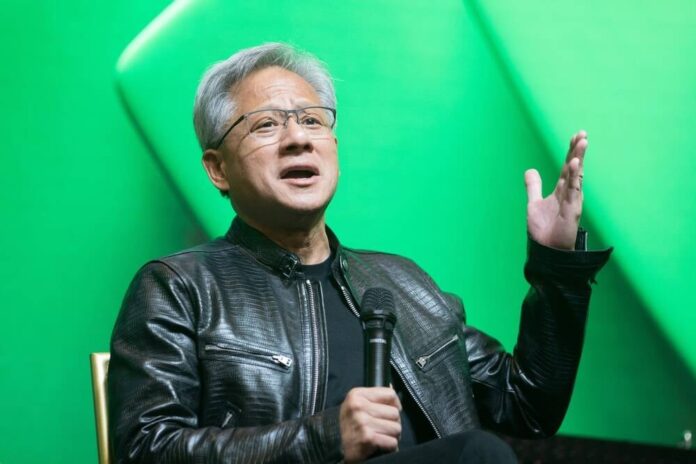Nvidia’s troubles with the US government have just begun: The day after the Trump administration’s export restrictions on its AI chips triggered a $5.5 billion charge, US elected officials are now demanding answers about how advanced silicon ended up in China. Meanwhile, CEO Jensen Huang has flown to China to try and smooth things over with the regime there.
The Republican and Democratic leaders of the House Select Committee on China sent a letter to CEO Jensen Huang on Wednesday asking him to detail how Nvidia chips may have ended up in the hands of DeepSeek. The Chinese firm, which startled AI giants in January by unveiling a surprisingly sophisticated and relatively inexpensive family of LLMs, said it used Nv’s H800 GPUs, which were originally designed to comply with US export restrictions but later banned from shipment to China.
The request follows growing concern that these and other chips may have been diverted through indirect channels, potentially circumventing current export controls.
“Despite multiple rounds of US export restrictions on AI chips, DeepSeek’s ability to develop cutting-edge AI models suggests that loopholes or indirect channels may still exist,” Commission Chair John John Molenaar (R-Mi) and Ranking member Raja Krishnamoorthi (D-il) won.
“The recent arrest of three men in Singapore — including one PRC national — for allegedly fraudulently labeling the end-use customer of Nvidia chips provides evidence of this exact concern.”
Singaporean officials and Nvidia have both denied any wrongdoing amid allegations that the city-state may have served as a conduit for Nvidia chips ultimately destined for Chinese firms, potentially circumventing US export controls.
Nvidia has acknowledged in its recent financial filings that “most shipments associated with Singapore revenue were to locations other than Singapore,” but maintained that this doesn’t prove Chinese companies like DeepSeek were the ones acquiring them illegally.
Moolenaar and Krishnamoorthi’s demand could shed light on the final destinations of Nvidia chip sales routed through Singapore and elsewhere, as the pair gave the chip shop until April 30 to hand over detailed records of its dealings in the region.
Specifically, the lawmakers requested a list of all Nvidia customers who purchased more than 499 AI-related chips or accelerators (eg, the H800, H20, and others) between 2020 and 2025, with an end-use location in any Association of Southeast Asian States countries and China (including Hong Kong and Macau).
The letter also calls for all communications between Nvidia and DeepSeek, as well as any contractual agreements with Chinese entities currently subject to US government restrictions or bans.
American innovation should never be the engine of our adversaries’ ambitions.
“We now know this tool [DeepSeek] exploited US AI models and reportedly used advanced Nvidia chips that should never have ended up in CCP hands,” Moolenaar said, referring to a report [PDF] the Committee released along with the letter to Huang. “That’s why we’re sending a letter to Nvidia to demand answers. American innovation should never be the engine of our adversaries’ ambitions.”
Nvidia insists it’s not in violation of any US rules.
“The US government instructs American businesses on what they can sell and where – we follow the government’s directions to the letter,” Nvidia said in a statement. “Our reported Singapore revenue indicates the billing address, often for subsidiaries of our US customers. The associated products are shipped to other locations, including the United States and Taiwan, not to China.”
Xi waits with open arms
As we reported on Wednesday, the Trump administration has imposed fresh export controls on Nvidia’s H20 AI accelerators, which were specifically designed to comply with earlier restrictions in order to keep selling into China.
The move caught Nvidia off guard, leading the biz to announce a $5.5 billion charge. Its stock took a hit from the news, and Huang has traveled to China to engage in high-level discussions.
Huang flew to Beijing Wednesday at the invitation of the China Council for the Promotion of International Trade, according to Chinese state media, where he reportedly expressed his intention to continue doing business in the Middle Kingdom.
This is a stark example of how the current US trade stance is pushing countries and companies further toward China, not away from it – financially, economically, politically, and diplomatically
Nigel Green, CEO of UAE-based financial consultancy deVere Group, said Huang’s trip is yet another example of the unintended consequences of Trump’s tariff-first trade strategy.
“This is a stark example of how the current US trade stance is pushing countries and companies further toward China, not away from it – financially, economically, politically, and diplomatically,” Green said in a statement emailed to The Register. “By weaponizing trade controls and blindsiding key US firms, the administration is encouraging global actors to build parallel systems and deepen ties with Beijing.”
Green said that Trump’s decision to blindside Nvidia with the H20 ban shows “instability … not strength” following reported signals from the US government following Huang’s Mar-a-Lago dinner that the custom-designed chip might be allowed into China.
- California sues President Tariff
- Nvidia joins made-in-America party, hopes to flog $500B in homegrown AI supers by 2029
- White House confirms 245% tariff on some Chinese imports not a typo
- US AI shares battered, bruised, and holding after yesterday’s DeepSeek beating
“Jensen Huang showing up in Beijing with a smile, just after taking a multibillion-dollar hit from a White House directive, speaks volumes,” Green added. “It’s not defiance – it’s realism. Business is being done where there’s opportunity and continuity. Right now, that’s increasingly outside the US sphere.”
Huang’s responsibility to shareholders, in other words, means China isn’t as unappealing as the Trump administration is trying to make it appear. (r)


